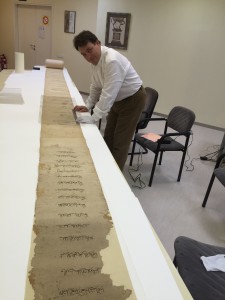Funded by the CSIC (Spain), in collaboration with the Université de Liège (Belgium) and the Université d’Aix-Marseille (France):
The diplomatic exchanges between Islamic Mediterranean and Christian European powers in the Middle Ages:
New methods for the analysis of documents
Objectives
The main objective is to create an international research group of specialists in the study of Arabic and Christian diplomatic documents in the Late Middle Ages, and to develop a common methodology combining philological and historical perspectives. The methodological focus will include specific aspects of the study of Arabic diplomatic documents from the Middle Ages, such as:
- The establishment of a model (or models) for the diplomatic description of the documents based on standardized criteria. The model(s) will be used to assess both the Arabic documents and those in Latin or Romance languages.
- The establishment of a model (or models) for the paleographic description of the documents, with a set of standardized criteria. The model(s) will be used to assess both the Arabic documents and those in Latin or Romance languages.
- The definition of common guidelines for the edition or re-edition and translation of the texts in Arabic, in Latin or in other Romance languages, their contemporary translations, and contemporary archive materials.
- Reaching agreement on the processes of revision of the old editions and translations available, and a substantial broadening of the study of the processes by which they were produced.
- The establishment of paradigms for the study of linguistic and terminological features, both of the Arabic of the original texts and of the contemporary Latin and Romance translations; a linguistic study of the Arabic, Latin and Romance languages used in correspondence (dialectology, diplomatic and notarial formulae, vocabulary …) and their translations.
- Methodology for the selection, evaluation and classification of complementary historical materials that provide contextualization (letters in Latin, Catalan, Italian and other chancery documents).
- Comparison of the practices and arts of chancery used by the various Islamic powers in the mediaeval Mediterranean, by consulting the secretarial manuals in use at that time as guidelines for the preparation of documents in Arabic.
- Guidelines for the compilation of a comprehensive record of the individuals who took an active or a passive part in diplomatic exchanges and in the transmission of documents, or who are mentioned in them.
- Prosopographic studies of the individuals involved; identification and characterization of the groups that mediated in the political and diplomatic contacts of the relations between European cities and the Arab countries of the Mediterranean.
- The study of the mechanisms and strategies for exploiting the linguistic and cultural skills of these groups.
- Guidelines for analyzing the strategies of socio-economic, political and institutional integration of European groups in the Arab-Islamic countries of the Mediterranean and the presence of Islamic groups in the Christian lands.

Members of the official team
Roser SALICRÚ I LLUCH (CSIC, Milà i Fontanals Institution, Barcelona) and Marta MANSO RUBIO (CSIC, Milà i Fontanals Institution & Universitat de Barcelona): Nasrids-Crown of Aragon, Christian sources.
Maria MERCÈ VILADRICH GRAU (Universitat de Barcelona) and Anas BENMOKHTAR (Universitat de Barcelona): Merinids-Crown of Aragon.
Mohamed OUERFELLI (Université d’Aix-Marseille): Hafsids-Crown of Aragon and Hafsids-Pisa.
Frédéric BAUDEN (Université de Liège): Mamluks-Crown of Aragon and Mamluks-Venice; Élise FRANSSEN (Université de Liège): Material and Palaeographical Study of the documents; Alessandro RIZZO (Université de Liège): Mamluks-Florence.

